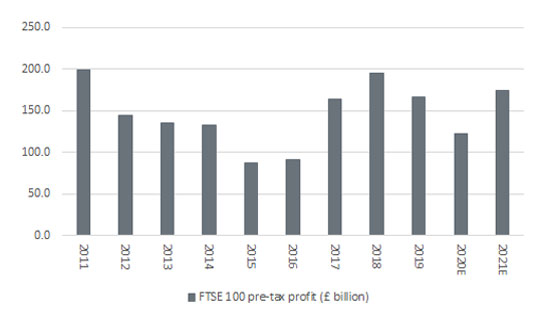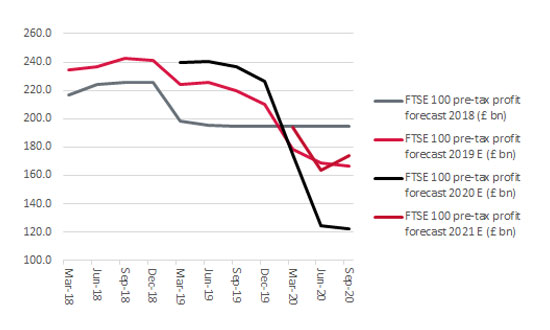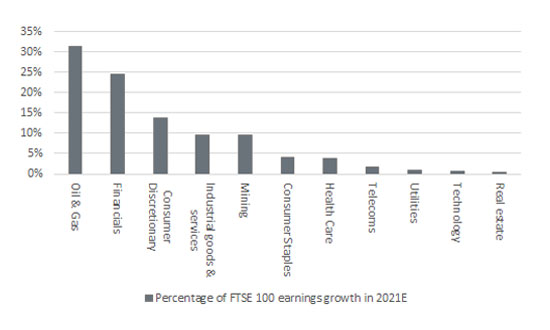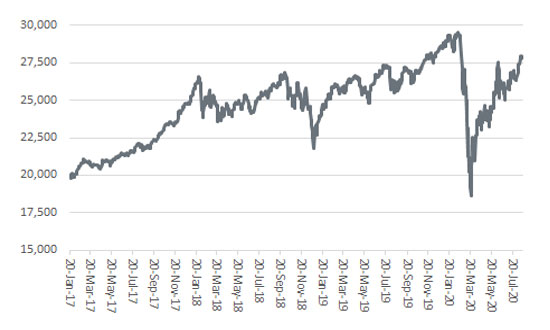


No one can agree upon the origins of the quote, “Hope is not a strategy”. This column cannot be sure and a trawl of the internet sees commentators attribute it to everyone from former US President Barack Obama, to film director James Cameron, to former New York City Mayor Rudi Giuliani, to one-time Green Bay Packers American football coach Vince Lombardi.
One thing is certain, however: hope is not a strategy when it comes to investment. Any selection should be made with downside protection in mind first, followed by a clear assessment of potential returns, with a set target for the overall gain, to ensure that possible rewards more than compensate for the possible dangers.
“It seems as if fears of an extended economic downturn thanks to a prolonged pandemic are being offset by markets’ hopes for more fiscal and monetary stimulus, which they feel in turn will stoke a sharp recovery in profits, dividends, share prices and asset valuations in 2021 and beyond.”
At the moment, it seems as if fears of an extended economic downturn thanks to a prolonged pandemic are being offset by investors’ hopes for more fiscal and monetary stimulus, which they feel in turn will stoke a sharp recovery in profits and dividends – and presumably share prices and asset valuations – in 2021 and beyond.
This scenario could yet pan out and it is unlikely that central banks and governments will stop running quantitative easing (QE) schemes, racking up budget deficits or even experimenting with new ideas such as Modern Monetary Theory or Universal Basic Income if the economic outlook becomes any more uncertain.
What any of those will do over time to faith in fiat currency is a question for another time, but they do seem to be underpinning hopes for a rapid recovery in UK plcs’ earnings power, at least if trends in FTSE 100 earnings forecasts are any guide.
Taking an aggregate of the bottom-up forecasts for all 100 members of the UK’s premier index, analysts are currently expecting a sharp rebound in pre-tax profit, to £174.2 billion in 2021, from 2020’s £122.2 billion.
Analysts are forecasting a big bounce in FTSE 100 earnings in 2021

Source: Company accounts, Sharecast, analysts’ consensus forecasts
To test the reliability of such an estimate – and whether it is a safe assumption upon which to base an assessment of the valuation of the UK market (since the FTSE 100 represents over 80% of its market cap and earnings power) – investors can look at three barometers.
“An outcome of £174.2 billion in 2021 would take next year’s pre-tax profit total for the FTSE 100 to a level 5% above that of 2019 and one just 10% below 2018’s all-time high.”
Consensus FTSE 100 earnings estimates for 2021 are creeping higher

Source: Company accounts, Sharecast, analysts’ consensus forecasts
“In terms of sectors, Oil & Gas is expected to generate nearly a third of the FTSE 100’s £52 billion jump in pre-tax profits on its own. Another quarter of the increase is seen coming from Financials (banks and insurers) and another quarter from consumer discretionary and industrial stocks.”
In terms of sectors, Oil & Gas is expected to generate nearly a third of the FTSE 100’s £52 billion jump in pre-tax profits on its own. Another quarter of the increase is seen coming from Financials (banks and insurers) and another quarter from consumer discretionary and industrial stocks.
Oils, financials and cyclicals are seen spearheading the FTSE 100’s earnings recovery in 2021

Source: Sharecast, analysts’ consensus forecasts
This picture is confirmed by the company-by-company breakdown of forecast FTSE 100 profit growth. Oil majors BP and Royal Dutch Shell top the list, with four banks also in the top 10, alongside two miners – Glencore and Anglo American – as well as British Airways owner International Consolidated Airlines and aerospace supplier Rolls-Royce.
Analysing the finer details of each individual company may be beyond the resources of advisers but these are the names which their chosen UK equity fund managers must understand – and upon which they must have a clear view – if they are to generate the sort of performance that helps clients meet their financial goals and the managers justify their fees.
Just 20 firms are forecast to generate more than 80% of the FTSE 100’s profits growth in 2021

Source: Sharecast, analysts’ consensus forecasts
“It seems fair to say that this is high-octane mix. If there is a strong global economic recovery – thanks to a vaccine, fiscal and monetary stimulus or the virus simply becoming less potent – then the UK could well be a very interesting place to invest.”
It seems fair to say that this is high-octane mix. If there is a strong global economic recovery – thanks to a vaccine, fiscal and monetary stimulus or the virus simply becoming less potent – then the UK could well be a very interesting place to invest, especially as consensus forecasts put the FTSE 100 on 13.6 times earnings for 2020 with a prospective yield of 4.2% with sentiment on cyclicals, and especially oils and banks, well and truly washed out.
However, if the opposite happens, and the pandemic lingers and drags the economy down, it would be unwise to put too much faith in forecasts of a rip-roaring earnings recovery, or that 4.2% dividend yield for that matter (although that still comes in at 3.7% if you assume the banks pay nothing again, thanks to regulatory or economic pressures). The drive away from hydrocarbons and toward renewable energy could also hold back BP and Shell, and thus the FTSE 100, in the near term, which is a further factor that investors must consider.
This area of the website is intended for financial advisers and other financial professionals only. If you are a customer of AJ Bell Investcentre, please click ‘Go to the customer area’ below.
We will remember your preference, so you should only be asked to select the appropriate website once per device.